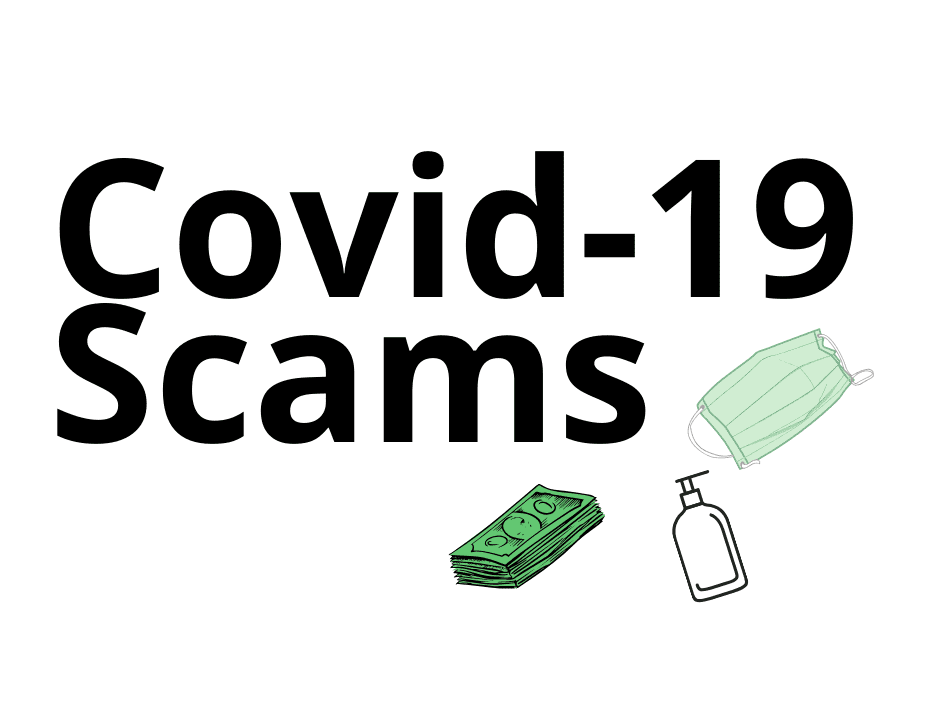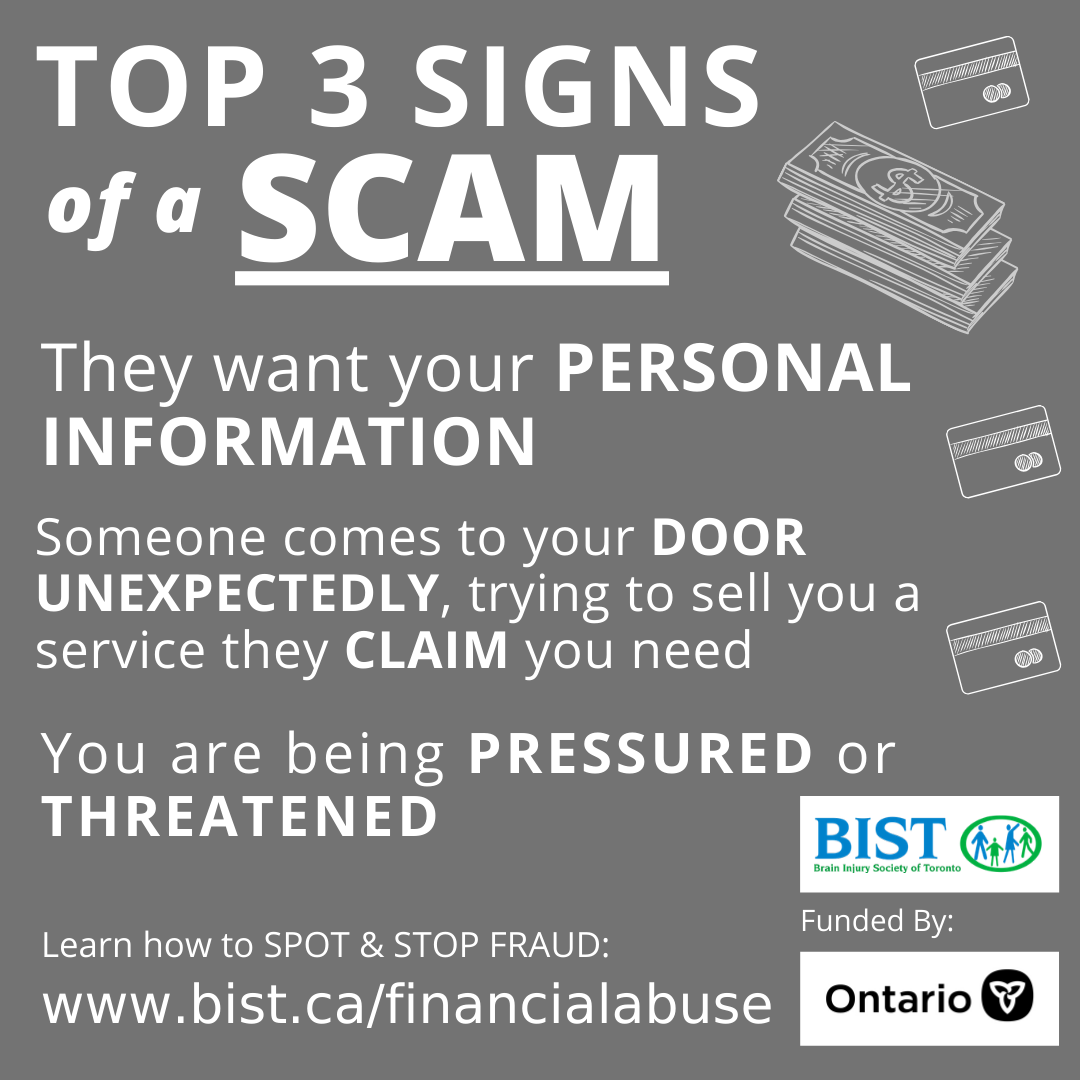
BY: JULIA RENAUD
Scammers flourish during times of crisis, and sadly the COVID-19 Outbreak is no exception.
People living with dementia and Acquired Brain Injury (ABI) may have slowed information processing abilities and other cognitive symptoms. This means that people living with these conditions – and those who care for them – have to be even more vigilant in protecting themselves against scams and fraud.
The Canadian Anti-Fraud Centre has up-to-date information on current scams, including those related to the COVID-19 Outbreak.
These scams include:
- A scam that comes by text, claiming to have information about the Government of Canada’s New Emergency Response Benefit. The best place to get reliable information about financial benefits is the Government of Canada’s website. You can also contact 211 by dialling 2-1-1 OR contact the BIST Office: 416-830-1485 or info@bist.ca.
- False healthcare or research information – often they will want to sell you fake treatments.
- Fake charities requesting money to assist victims or do research. Do not feel pressured to make a donation. You can verify that a charity is registered, HERE.
- Fake and deceptive online ads, including:
- cleaning products
- hand sanitizers
- other items in high demands
If you think you are being targeted by a COVID-19 or any other scam, you can contact:
- The Police: 416-808-2222
- The Canadian Anti-Fraud Centre
- 211
- BIST: 416-830-1484
Risk of financial exploitation can increased if someone is grieving the loss of a loved one, living alone, and / or dealing with adverse health conditions. Older adults are more likely to experience more than one of these challenges.

How can I protect myself?
Information is power: BIST is spreading awareness to ensure that you and your loved ones are armed with the information you need to prevent financial abuse and fraud. This project is funded by the Government of Ontario.
Check out our Online Toolkit: bist.ca/financialabuse for information!
The topics are broken down as follows, each with their own dedicated webpage:
- Financial Abuse: Spot It and Stop It
- Fraud: Spot It and Stop It
- Learn About Common Scams
- Learn About Resources That Can Help
- Printable Resources
What Is the Difference between Financial Abuse & Fraud?
Financial Abuse:
- Occurs when someone you know and trust gains financially at your expense.
- It can range from being quite obvious to very tricky to spot.
- Often occurs repeatedly rather than in one isolated event.
Examples of Financial Abuse:
- Someone stealing money from your wallet.
- Feeling pressured to sign documents that you don’t understand.
Fraud:
- Occurs when someone deceives you into giving up money, property, or personal information for their own gain.
- The general goal is to get money. This is usually done through scams targeting you directly to pay up, or indirectly through using your personal information. Common scams include phone, door-to-door, and online.
- Fraud is a crime.
Examples of Fraud:
- Someone pressuring /threatening you to give them your money.
- Someone coming to your door unexpectedly to sell you a service.
- Someone stealing your personal information (identity theft).
Find more examples of common scams: https://bist.ca/scams/
Learn more about Fraud and how to protect yourself: https://bist.ca/fraud/
What are the Similarities between Financial Abuse & Fraud?
- Both can happen anywhere to anyone – no one is immune!
- Protect yourself against financial abuse and fraud with knowledge and resources.
What Can I Do About It?
- If you think you are a victim of financial abuse or fraud, report it to your local Police Department.
- Call BIST at 416-830-1485 or info@bist.ca. We are open and providing telephone and online support during the COVID-19 Pandemic.
- Visit the BIST Resources page for more info and checklists to make sure you are protecting yourself. https://bist.ca/anti-fraud_resources/

Top Takeaways
- If you are experiencing dementia &/or ABI, you may be at greater risk of experiencing financial abuse and fraud.
- Know the various types of scams that scammers use so you can protect yourself.
- If you are unsure about something, ask someone you trust. It never hurts to get another opinion.
- If you think you have been a victim of financial abuse &/or fraud, know that you are not alone! – These can affect anyone. Contact your Local Police Department.
BIST is holding a FREE Webinar on Wednesday, April 1st at 2 pm on How to Protect Yourself Against Financial Abuse and Fraud – Including COVID-19 Scams! Register for the Webinar, HERE.
You’ll need to use the ZOOM App to attend this webinar. Find out how, HERE.
Funded By:
Julia Renaud is a ABI survivor with a passion for learning new things, trying new activities, and meeting new people – all of which have led her to writing this column. She is an advocate within the health care community and has been featured in the coffee table book, A Caged Mind by May Mutter, which exposes the nature of concussions through body painting.







